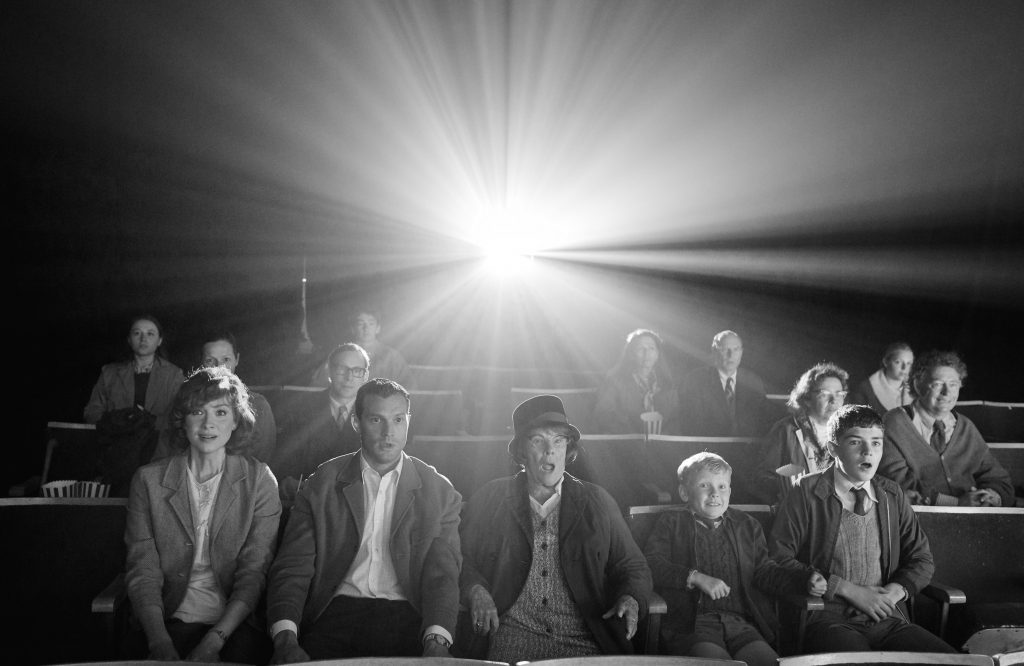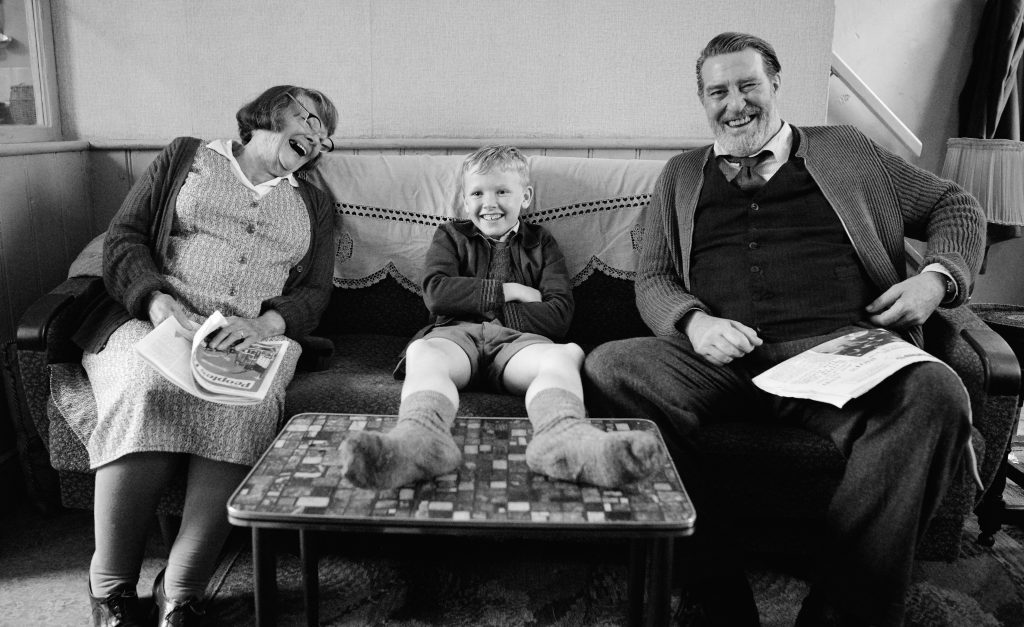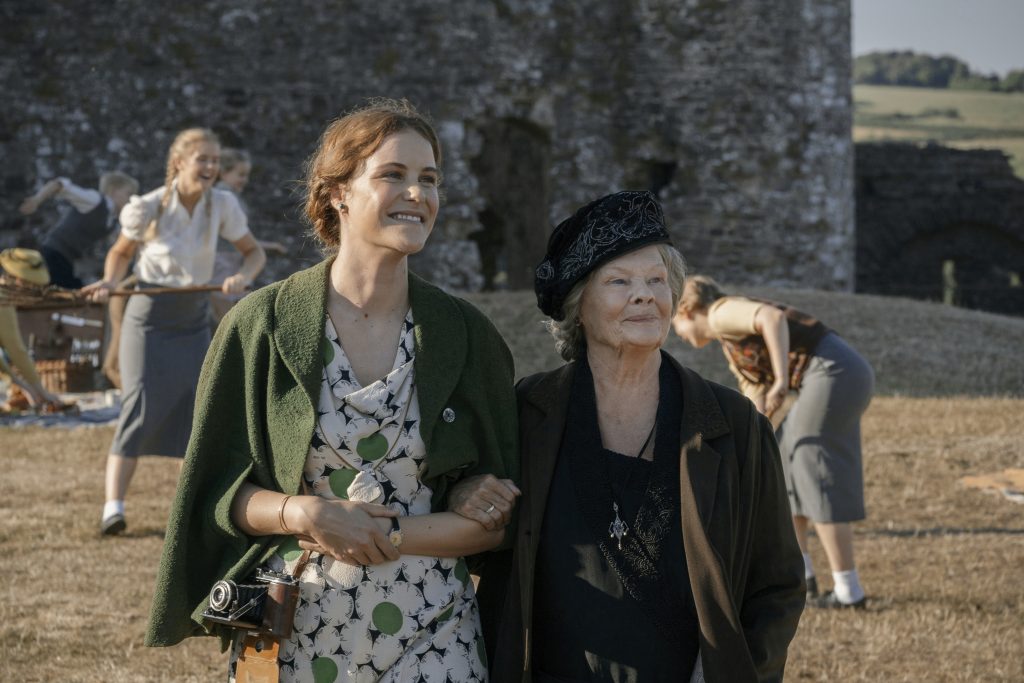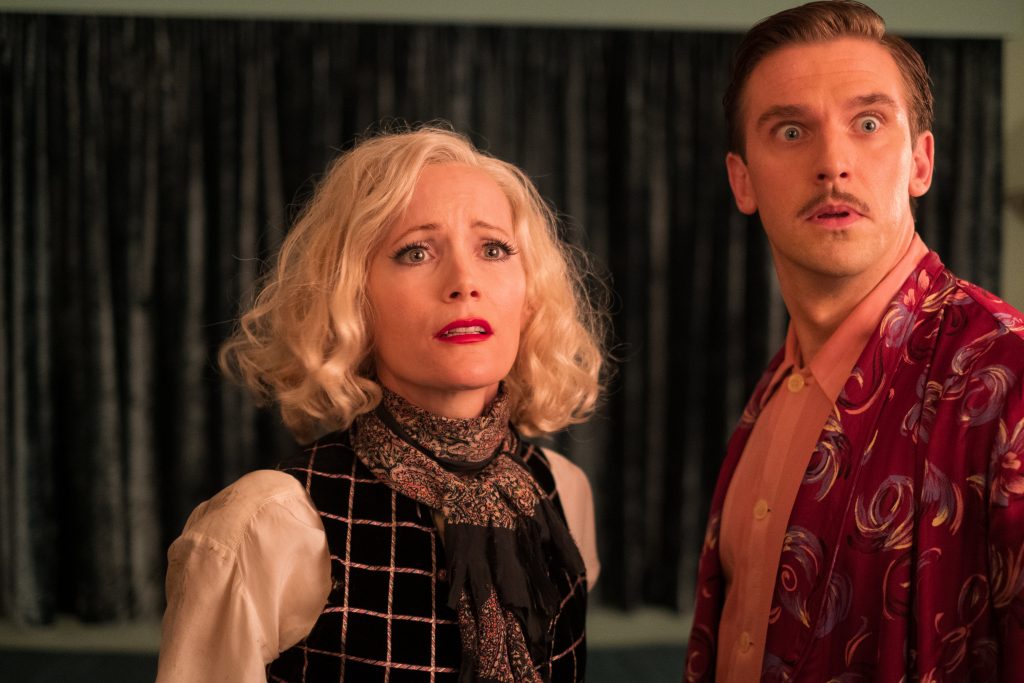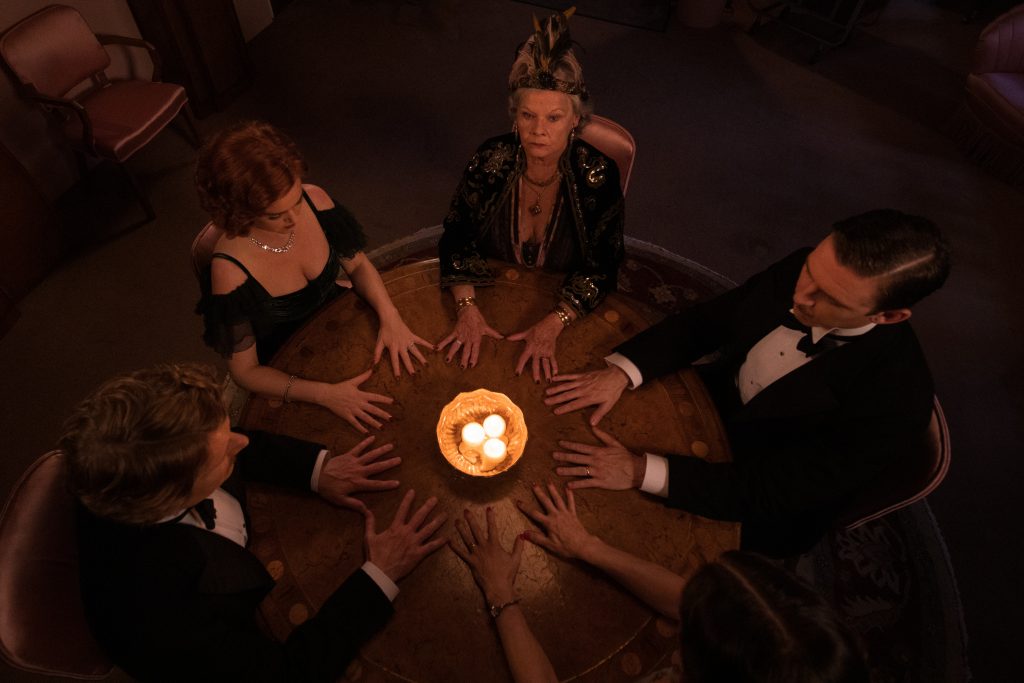December 24, 2022
by Carla Hay
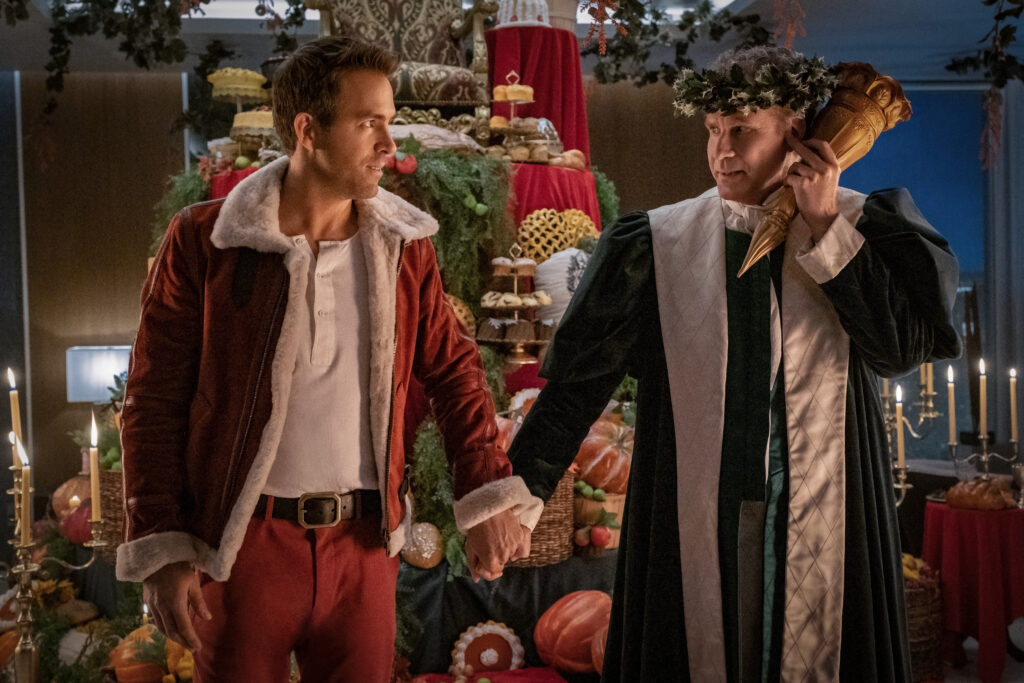
Directed by Sean Anders
Culture Representation: Taking place in Minnesota, New York City and briefly in Vancouver, the musical comedy film “Spirited” (a reimagining of “A Christmas Carol”) features a predominantly white cast of characters (with some African Americans, Asians and Latinos) representing the working-class, middle-class and wealthy.
Culture Clash: The Ghost of Christmas Present is determined to redeem a corrupt media strategist who is considered irredeemable.
Culture Audience: “Spirited” will appeal primarily to fans of “A Christmas Carol,” musical comedies, and stars Will Ferrell and Ryan Reynolds.

“Spirited” revels in being a campy, musical reimagining of “A Christmas Carol,” the classic 1843 novella by Charles Dickens. The movie combines formulaic comedy with unexpected plot twists and catchy songs. The cast members also look like they’re having fun, which brings some enjoyment to watching. With a total running time of 127 minutes, “Spirited” has a sluggish middle section that somewhat drains the movie of its lively musical energy with too much dialogue. However, “Spirited” recovers in the last third of the movie, with a tone that is expected but plot developments that might surprise many viewers.
Directed by Sean Anders (who co-wrote the “Spirited” screenplay with John Morris), “Spirited” begins by showing the Ghost of Christmas Yet-to-Come, also known as Yet-to-Come (played by Loren G. Woods and voiced by Tracy Morgan), who looks like a Grim Reaper. Yet-to-Come is haunting Ms. Karen Blansky (played by Rose Byrne) in a graveyard. She has apparently been a mean-spirited person, who is about to be punished by the ghost. Before the ghost plunges her underneath the ground, she begs for mercy and promises that she will not yell at the neighbors’ children any more.
Luckily for Karen, the ghost only wants to scare her into redeeming herself. Karen wakes up to find out that her life has been spared. And she decides to turn her life around and become a friendly person. She’s seen playing outdoor hockey with the neighborhood kids, using a round Christmas ornament instead of a hockey puck. Now that Karen has become a better person, time temporarily freezes, and several ghosts from the afterlife appear to sanction this redemption.
The Ghost of Christmas Present (played by Will Ferrell), also known as Present, says in a voiceover: “That’s what we do: We haunt someone, we change them into a better person, and we sing about it.” The ghosts then go back to their afterlife “headquarters” to celebrate this successful redemption. The other ghosts who work at the afterlife “headquarters” include the Ghost of Christmas Past (played by Sunita Mani), also known as Past, who is fun-loving and somewhat sarcastic, and ghost supervisor Marley (played by Patrick Page), who is a no-nonsense taskmaster.
Present has been dead since the 1800s and has spent the past 46 seasons redeeming people. A human-resources employee named Margot (played by Lily Sullivan) asks Present if he will ever retire and suggests that he should, but he’s not ready to retire. Present later reveals what he will get if he retires: a watch, a Sephora gift card, and a chance to go back to Earth and relive his life as a human.
One of the reasons why he doesn’t want to retire yet is that he has his sights set on redeeming what the ghosts call a “perp” (short for perpetrator): Someone who is their next target to haunt and possibly redeem. His name is Clint Briggs (played by Ryan Reynolds), the owner/president of Briggs Media Group, a consulting firm whose specialty is creating toxic controversy for publicity and profits.
Marley looks at the file on Clint and thinks that Clint is irredeemable and says it’s not worth trying to save Clint. Present vehemently disagrees and threatens to quit and retire if the group doesn’t try to redeem Clint. Marley reluctantly agrees because he doesn’t really want to lose this valuable ghost employee. Clint’s work has a worldwide influence, so Present believes that if Clint can be redeemed, the new and improved Clint can do good deeds that will have ripple effects around the world.
And so, this ghostly group travels to a hotel in Vancouver, where Clint is making a speaking appearance at a convention for the National Association of Christmas Tree Growers, who are worried about the rising popularity of artificial Christmas trees. Instead of telling these tree growers positive things that they want to hear, Clint gives a cynical lecture about how people prefer artificial Christmas trees because they are lazy and desperate. He also says that the Christmas tree growers need to sell not only the trees but also sell the idea that a real Christmas tree is about continuing Christmas traditions.
Clint has an executive vice president named Kimberly (played by Octavia Spencer), who is loyal to her boss but also morally conflicted about the dirty tricks that the company uses to get what Clint wants. The Briggs Media Group frequently ruins people’s reputations with smear campaigns. Kimberly will eventually reach a point where she will decide if she will continue with this type of work or not.
The ghosts have done a background check on Clint and found out that he grew up in Minnesota’s Minneapolis-St. Paul area, as the middle child of a single mother named Wendy (played by Jen Tullock), who is later revealed in a flashback to be an irresponsible alcoholic. Clint’s older sister Carrie (played by Andrea Anders), who was a single parent, died six years ago. It’s revealed in a flashback that Carrie decided to become a mother through a sperm donation.
Carrie’s daughter Wren (played by Marlow Barkley), who is now 13 or 14 years old, is being raised by Clint’s younger brother Owen (played by Joe Tippett), who is almost the opposite of Clint. Clint is clean-cut, wears business suits, and has an intense, competitive personality. Owen is long-haired, wears jeans and flannel shirts, and has a laid-back, mild-mannered personality.
A big part of the “Spirited” plot revolves around Wren wanting to be elected her president of her eighth-grade class. Her biggest rival in the campaign is a popular kid named Josh Hubbins (played by Maximillian Piazza), whose parents own a charitable, non-profit group that does an annual Christmas dinner event for homeless people. Wren asks Clint for help in her campaign.
And you can easily guess what happens next: Clint, with Kimberly’s help, finds “dirt” on Josh. Two years ago, Josh made a TikTok video where he insulted the Christmas dinner event for the homeless. Josh deleted the video two years ago, but Kimberly was able to find it. Kimberly has mixed feelings about using this video to ruin Josh’s reputation, but she gives this video to Wren anyway. Clint encourages Wren to make the video public when the time is right.
There are some other subplots in “Spirited” that get varying degrees of development. Clint is supposed to be haunted by Past, but her judgment is affected, because she thinks Clint is attractive and quickly develops a crush on him. Meanwhile, Present shows himself to Kimberly by accident, and they have a mutual attraction that Present doesn’t know how to handle because he’s afraid to tell Kimberly that he’s really a ghost.
In between, there are some very entertaining song-and-dance numbers, with the movie’s original songs written by Oscar-winning “La La Land” composers Benj Pasek and Justin Paul. The movie’s choreography (led by Chloe Arnold) is a very good complement to the peppy and frequently amusing original songs. No one should expect Ferrell, Reynolds and Spencer to be fantastic music artists, by they handle their musical performances with a lot of charisma and skilled emotional expressions.
Some of the original songs in the film include “Bringin’ Back Christmas,” “Tiny Ripple,” “The View From Here,” “Good Afternoon,” “The Story of Your Life,” “Do a Little Good,” “That Christmas Morning Feelin’.” Not all of the songs are meant to be comical or jolly. Spencer’s solo singing of “The View From Here” expresses Kimberly’s regretful contemplation that Kimberly got what she wanted in her career ambitions, but she worries that she could have lost her conscience in the process.
A running joke in the movie begins during a time-traveling segment going back to the 1820s, when the saying “Good afternoon” is supposed to be an insulting comment. The time traveling and flashbacks in “Spirited” aren’t always handled very smoothly. And the movie occasionally gets overstuffed with subplots, which leads the movie to go off on a few tangents that run a little too long before things get back on track. (Look for a very quick and amusing cameo from Judi Dench.)
One of the main reasons to watch “Spirited” is that the cast members have engaging chemistry with each other. Ferrell and Reynolds have a talented ability to deliver goofy comedy with some heartfelt moments, while Spencer and the other supporting cast members are also a compatible match in this ensemble. Unless someone watching “Spirited” is in a very bad mood, it’s the type of movie that can guarantee some laughs and good-enough entertainment that puts a unique spin on a Christmas classic.
Apple Studios released “Spirited” in select U.S. cinemas on November 11, 2022. The movie premiered in Apple TV+ on November 18, 2022.

